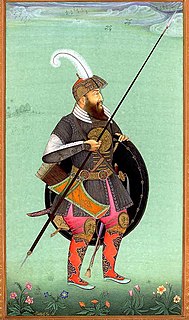 W
WThe Afridi are a tribe of Pashtuns. Their traditional homeland is in Khyber and Darra Adam Khel in Khyber Pakhtunkhwa, Pakistan.
 W
WBaig, also commonly spelled Beigh, Beg, Bek, Bey, Baeg or Begh was a title which is today used as a name to identify lineage. It means Chief or Commander and is common in Turkey, Iran, the Caucasus, Central Asia, South Asia and Southeastern Europe and among their respective diaspora.
 W
WBegum is a royal and aristocratic title from Central and South Asia. It is the feminine equivalent of the title baig or bey, which in Iranian languages means "higher official" which derives from Proto Indo Europaen root word of "*bʰh₂g-" and borrowed by Turkic languages. It usually refers to the wife or daughter of a beg. The related form begzada also occurs.
 W
WChanna also spelled as Chana, is one of the ancient Sindhi tribes in Sindh, Pakistan.
 W
WThe Ghiljī also spelled Khilji, Khalji, or Ghilzai or Ghilzay (غلزی), are one of the largest tribes of Pashtuns. Their traditional homeland is Ghazni and Qalati Ghilji in Afghanistan but have also settled in other regions, primarily, Pashtunistan which encompasses the Afghan-Pakistan frontier. The modern nomadic Kochi people are predominantly made up of Ghilji tribes. The Ghilji make up around 20-25% of Afghanistan's total population.
 W
WThe Harifal are a Pashtun tribe inhabiting the Sherani District in the Balochistan province of Pakistan, and, to a lesser extent, the surrounding districts of Afghanistan.
 W
WMian or Miyan is a royal title of the Indian subcontinent, also sometimes used as a surname. Begum or Beygum, is used to describe the wife of a Mian. It is used by several monarchs of Indian states.
 W
WSingh is a title, middle name, or surname that means "lion" in various South Asian languages. Traditionally used by the Hindu Kshatriya community, it was later mandated in the 18th century by Guru Gobind Singh for all male Sikhs as well, in part as a rejection of caste-based prejudice. It has also been adopted by several castes and communities. As a surname or a middle name, it is now found throughout the world across communities and religious groups, becoming more of a title than a surname.